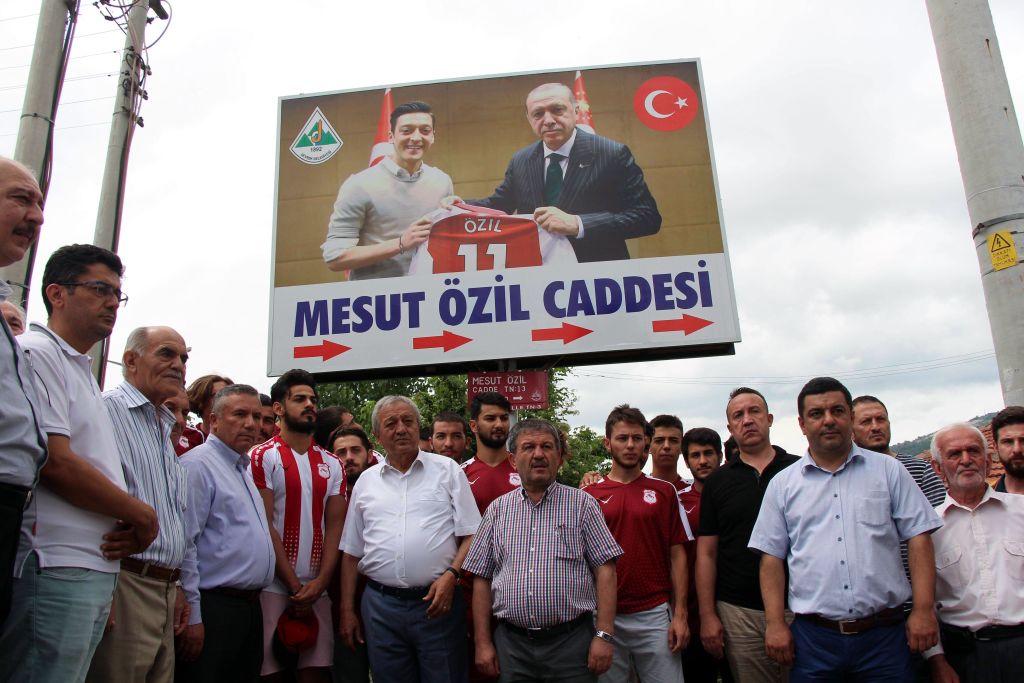The morning after Mesut Özil’s shock resignation from the German national football team, his family’s ancestral home set to work. Enlisting the help of the local fire brigade, locals in Devrek, a small village near Turkey’s Black Sea coast, removed the large board at its entrance of the star midfielder in his Germany kit. The picture chosen as its replacement was a giant version of the image that first caused the furore – a photograph of Özil shaking hands with president Recep Tayyip Erdoğan.
The response of this small village was far from unique in Turkey. Özil’s resignation has played out very differently here to how it has in Germany. The footballer’s experience has been seized upon by supporters of the Turkish president, a divisive populist who draws strength from Western criticism. It offers a salient example of how attempts to stand up to autocrats can backfire.
Özil’s announcement at the end of July that ‘racism and disrespect’ had forced him to step down from the national team stemmed from an incident two months earlier, when the Arsenal midfielder and two other German-Turkish footballers met with Erdoğan when he visited London. Özil was bombarded with criticism after the meeting: he was dropped from public events, booed by his own fans and held personally responsible by some commentators for Germany’s early World Cup exit.
The decision to meet with the Turkish president in the middle of an election campaign was undoubtedly naive. So too was Özil’s justification that the audience with Erdogan – who regularly describes opposition parties as traitors – had “no political intentions”. But the deluge of opprobrium he faced afterwards missed the mark. Özil rightly claimed that the criticism – which included being called a “goat fucker” by the “social democrat” politician Bernd Holzhauer – had tipped over into racism.
In Germany, the saga prompted soul-searching about the shortcomings and challenges of the country’s multicultural project. Some of the concerns are legitimate. Many, for instance, feel angry to see a player of their football side seeming to endorse a politician who has compared the German government to Nazis.But mixed ancestry is complicated. In recent weeks, the hashtag #metwo has been used to share more than 200,000 tweets about everyday racism in Germany. Its originator says it represents having two cultures – in his case, German and Turkish – that don’t contradict each other. While German-Turks face accusations at home of being insufficiently integrated, their critics might be surprised to hear that they don’t fully fit in Turkey either. There is even a special word for them in Turkish — Almancı — which is used derogatorily to sneer. It’s now the summer holidays and in the cafes of Ankara, where I live, locals giggle at their broken Turkish and grumble about their cars with foreign-license plates clogging up the streets.
Perhaps Özil’s critics think that they are taking a defiant stance against an autocrat. Yet their actions are counter-productive. In Turkey, Özil’s treatment has been seized upon by the government to bolster the sentiment that has helped to keep Erdoğan in power for the last 16 years – and just helped him win five more. Attacks from within on the Turkish-German superstar fuel the Turkish government’s favourite narrative that Europe is hypocritical, racist, and never treats Turkey fairly.
Once a staunch advocate of Turkey’s bid to join the EU, Erdoğan now uses Turkey’s soured relationship with the west to shore up his support. When he was struggling last year to get over the line in a contentious referendum on enhancing his own powers, he lashed out at Holland and Germany after they banned him from campaigning on their soil. Images of police dogs attacking pro-Erdoğan protestors in the Netherlands were played on loop on the TV news for weeks as evidence of the West’s ‘true face’.The Özil affair, in turn, has been a gift for the Turkish president. The media – dominated by pro-government outlets – have leapt on his resignation. “You are not alone, brave child,” read the headline of Karar newspaper two days after his announcement. “In European countries, it doesn’t matter what generation of migrant you are, the only choice [for acceptance] is to perform miracles,” snorted Saadet Oruç, a columnist for Star. Erdoğan himself rushed to telephone Özil to congratulate him on his actions.
There is more than an ounce of hypocrisy in this grandstanding. Turkey has its own problems with multiculturalism. I have met professional footballers who fled the war in neighbouring Syria who found themselves locked out of Turkish leagues. Deniz Naki, a German-born Kurdish player who is a vocal critic of the government’s treatment of Turkey’s Kurdish minority, fled the country last year after being banned from football. But the Özil affair helps neither Germany nor harms Erdoğan. Instead, it makes German-Turks feel under attack. And it bolsters the position of the very man that hardliners in Germany seem to imagine that they are standing up to. I think that is what footballers call an own goal. John McManus is the author of Welcome to Hell? In search of the real Turkish football





Comments